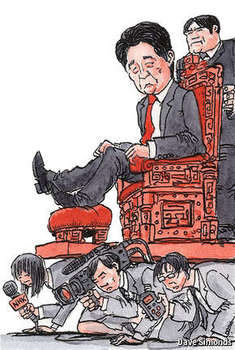日本のメディアは見ざる聞かざる言わざる [政治]
The media in Japan
「日本のメディア」
Speak no evil
「言わざる」
Japan’s media are quailing under government pressure
「日本のメディアは政府の圧力を受けて怖気づいてしまっている」
May 16th 2015 | TOKYO | From the print edition
安倍政権の最近のメディア介入についてイギリスの経済誌エコノミストが5月16日号で記事を書いていますので紹介します。

★日本のマスコミを意のままに?操る安倍首相
タイトルの speak no evilは Hear no evil, see no evil, speak no evil.「(悪いことは)見ざる、聞かざる、言わざる」ということわざから取ったもののようです。
この場合の悪いこととは安倍政権にとって都合の悪いことのようです。
マスコミが政府に都合の悪いことをspeak no evilでは日本の未来は暗い?
まず記事の冒頭では次のように述べています。
「野党の弱体化、選挙では政権維持は確実、そして支持率の上昇傾向と、安倍政権は現在向かうところ敵なしの盤石の状態だ。」
「(そしてそうした背景の下で)政府はメディアを脅すという高圧的なキャンペーンを大々的に展開して、政府寄りのジャーナリストたちからも不当な圧力だと批判の声が出ている。」
最近のメディア介入問題としてテレビ朝日の番組「報道ステーション」の古賀茂明氏のことを取り上げています。
それからNHKの番組「クローズアップ現代」のやらせ報道も取り上げています。
自民党がテレビ朝日とNHKの幹部を呼びつけて事情聴取を行うなどの権力介入、そして昨年秋の総選挙の時には、政府自民党がマスコミ各社にたいして公平・中立な報道をするようにとの通達を出すなどのマスコミ介入を展開する安倍政権の狙いとは一体何なのか。
エコノミストはその狙いについて次のように述べています。
Today Mr Abe’s cherished aim is to revise Japan’s constitution, written seven decades ago by the Americans, in which Japan renounces war as a sovereign right. Shifting the public away from its deeply held pacifism would require broad media backing, or at least for criticism to be muted.
「安倍首相の最大の目標は日本の憲法の改正である。これは70年前にアメリカ人によって書かれたもので、憲法で日本は国権の発動たる戦争を放棄している。国民に深く根差した平和主義からの方向展開には広くメディアの後押しが必要で、少なくとも政府批判を押さえつけておく必要がある。」
そして記事の最後に次のように書かれている。
「パリに拠点を置く報道監視機関である「国境なき報道(Reporters Without Borders)」が発表した報道の自由のランキングでは日本は61位でこの5年間で順位を50位も落としている。」
★海外メディアも懸念を示している日本の報道体制ですが、記載された風刺漫画のように安倍政権の意のままになってしまうのでしょうか。この先の安倍首相の動きが気になります。
The media in Japan
Speak no evil
Japan’s media are quailing under government pressure
May 16th 2015 | TOKYO | From the print edition
WITH a weak opposition, an election in the bag and buoyant approval ratings, the government of Shinzo Abe, Japan’s prime minister, would hardly seem to have much to fight against. Yet it is waging an increasingly heavy-handed campaign to intimidate the media. Even pro-government journalists are crying foul.
Discreet interventions by politicians have long been customary. But bullying recently broke into the open when a bureaucrat turned political gadfly, Shigeaki Koga, accused the government on a television show of strong-arming the media by securing his removal from “Hodo Station”, a news show owned by TV Asahi, a liberal broadcaster. The ruling Liberal Democratic Party (LDP) promptly proved Mr Koga’s point by grilling the programme’s producers over the outburst under the auspices of Japan’s broadcast law.
That brought the LDP close to overstepping the law’s guarantees of freedom of expression, media scholars say. Other recent cases of muzzling the media include thinly veiled threats over broadcasters’ licences. Last autumn the LDP demanded fair and neutral reporting on the snap general election in December. Many Japanese thought the election a waste of time and money. Television channels cut back their coverage. Not coincidentally LDP—which is able to get out its core voters and does better on low turnouts—won easily.
Mr Abe has objected to television interviews in which ordinary people say that his economic schemes are not helping them, though such a perception is common. Personnel changes at Japan’s main broadcasters are now routinely rumoured to be down to government pressure. Even foreign journalists complain that diplomats try to steer their reporting.
The long-term aim may be a broad reshaping of the media. While the LDP was out of office in 2009-12, it blamed the media for its humbling by the opposition Democratic Party of Japan. Today Mr Abe’s cherished aim is to revise Japan’s constitution, written seven decades ago by the Americans, in which Japan renounces war as a sovereign right. Shifting the public away from its deeply held pacifism would require broad media backing, or at least for criticism to be muted.
A particular target is NHK, the state broadcaster. The government also summoned executives from “Close-up Gendai”, a hard-hitting current-affairs programme, to answer for minor flaws. The broadcaster’s newish director-general, Katsuto Momii, a friend of Mr Abe, last year declared an intent generally to hew more closely to the government line. The LDP also cheered the departure in 2013, for family reasons, of Monta Mino; his forthright guests used daily to skewer the ruling party on television, says Michael Cucek of Sophia University.
The assault on broadcasters accompanies pressure on the most forceful of the establishment-minded big daily newspapers, the Asahi Shimbun, sister paper to TV Asahi. Last autumn the government and conservative media outlets savaged it for its admission that some of its reporting on the imperial army’s wartime use of sex slaves had relied on false testimony. The broad historical facts are not in doubt, yet journalists say that inside the Asahi it is now hard to write about the issue at all. The paper’s political reporters are often too cowed even to ask questions at government press conferences, rivals say.
Mr Abe would never go so far as to yank a broadcast licence, says one LDP politician, for that would smack of authoritarian government and prompt retribution at the ballot box. Yet there seems plenty of scope to encourage timidity. A new law on state secrets that could send journalists to prison for receiving leaked information will presumably dampen investigative appetites. In a global ranking of media freedom by Reporters Without Borders, a Paris-based watchdog, Japan now comes 61st, a fall of 50 places in just five years.




コメント 0